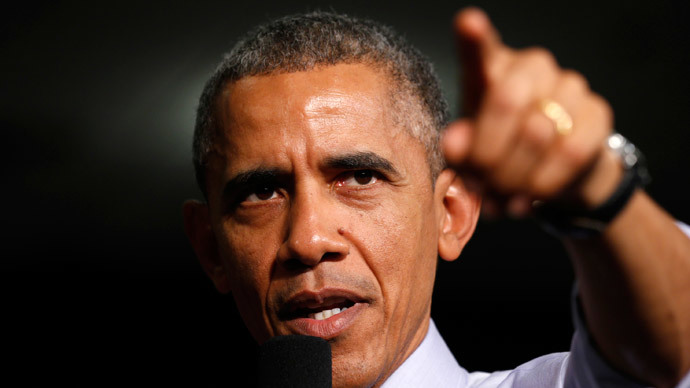Obama: 'We have to twist arms when countries don't do what we need them to'

President Barack Obama has said the reality of “American leadership” at times entails “twisting the arms” of states which “don’t do what we need them to do,” and that the US relied on its military strength and other leverage to achieve its goals.
READ MORE: ‘US unilateral actions to protect its interests let other govts use same excuse’
In a broad-ranging interview with Vox, which Obama himself described as a venue "for the brainiac-nerd types," the US president both denied the efficacy of a purely “realist” foreign policy but also arguing that at times the US, which has a defense budget that exceeds the next 10 countries combined, needed to rely on its military muscle and other levers of power.
Lauding the rule-based system to emerge in the post-World War II era, Obama admitted it wasn’t perfect, but argued “the UN, the IMF, and a whole host of treaties and rules and norms that were established really helped to stabilize the world in ways that it wouldn't otherwise be.”
He argued, however, that the efficacy of this idealistic, Wilsonian, rule-based system was severely tested by the fact that “there are bad people out there who are trying to do us harm.”
READ MORE: ‘Unexceptional’ US, Russia scrap over Putin’s NY Times Op-Ed
In the president’s view, the reality of those threats has compelled the US to have “the strongest military in the world.” Obama further says that “we occasionally have to twist the arms of countries that wouldn't do what we need them to do if it weren't for the various economic or diplomatic or, in some cases, military leverage that we had — if we didn't have that dose of realism, we wouldn't get anything done, either.”
'We occasionally have to twist the arms of countries that wouldn't do what we need them to do'
Obama argues that the US doesn’t have “military solutions” to all the challenges in the modern world, though he goes on to add that “we don’t have a peer” in terms of states that could attack or provoke the United States.
“The closest we have, obviously, is Russia, with its nuclear arsenal, but generally speaking they can't project the way we can around the world. China can't, either. We spend more on our military than the next 10 countries combined,” he said.
Within this context, Obama said that “disorder” stemming from “failed states” and “asymmetric threats from terrorist organizations” were the biggest challenges facing the international community today.
Obama also argued that tackling these and other problems entailed “leveraging other countries” and “other resources” whenever possible, while also recognizing that Washington is “the lead partner because we have capabilities that other folks don't have.”
'We spend more on our military than the next 10 countries combined'
This approach, he said, also led to “some burden-sharing and there's some ownership for outcomes.”
When asked about the limits of American power, Obama conceded that there were things that his administration simply cannot do in terms of power projection, but remained upbeat.
“Well, American leadership, in part, comes out of our can-do spirit. We're the largest, most powerful country on Earth. As I said previously in speeches: when problems happen, they don't call Beijing. They don't call Moscow. They call us. And we embrace that responsibility. The question, I think, is how that leadership is exercised. My administration is very aggressive and internationalist in wading in and taking on and trying to solve problems.”

This appeal to US leadership, which has often been couched within the notion of American exceptionalism, has regularly been questioned by Moscow.
'American leadership, in part, comes out of our can-do spirit'
Russian Foreign Minister Sergey Lavrov took issue with the notion past September, following Obama’s speech before the UN in which the US president named “Russian aggression in Europe” along with the Ebola epidemic and ISIS as threats to international peace and security.
Lavrov said that Obama’s address to the UN was the “speech of a peacemaker – the way it was conceived,” but added that he had “failed to deliver, if one compares it to real facts.”
READ MORE: Russia tops ISIS threat, Ebola worst of all? Lavrov puzzled by Obama’s UN speech
The Russian foreign minister added that Obama had presented a worldview based on the exceptionality of the United States.
“That's the worldview of a country that has spelt out its right to use force arbitrarily regardless of the UN Security Council's resolutions or other international legal acts in its national defense doctrine,” Lavrov said.
In a September 2013 Op-Ed article in the New York Times, Russian President Vladimir Putin said that the concept of American exceptionalism was a precarious one in the global arena.
"It is extremely dangerous to encourage people to see themselves as exceptional, whatever the motivation," Putin wrote. "There are big countries and small countries, rich and poor, those with long democratic traditions and those still finding their way to democracy. Their policies differ, too. We are all different, but when we ask for the Lord’s blessings, we must not forget that God created us equal."












